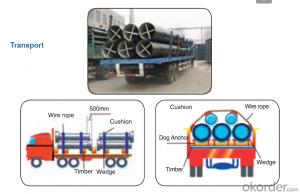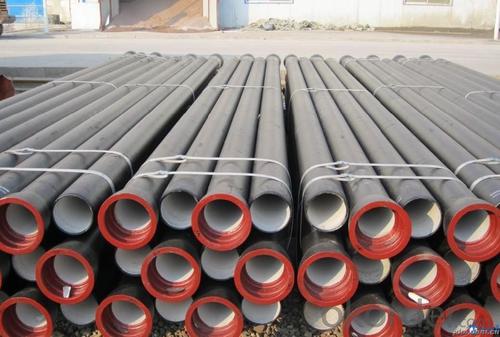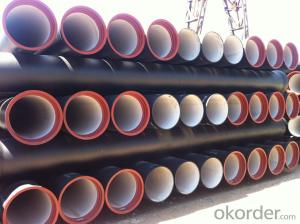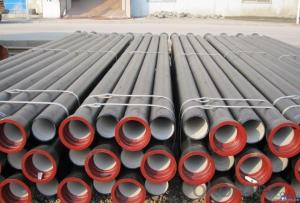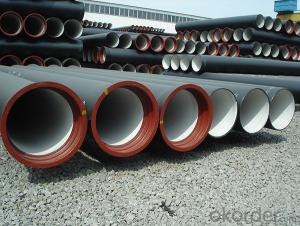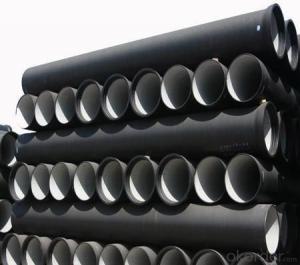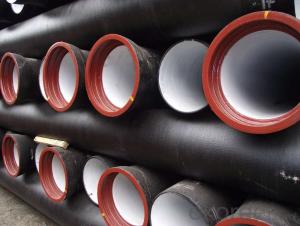Duct Iron Pipe DI Pipe ISO 2531 DN 80-2000mm K8
- Loading Port:
- Tianjin
- Payment Terms:
- TT OR LC
- Min Order Qty:
- 100 m
- Supply Capability:
- 100000 m/month
OKorder Service Pledge
OKorder Financial Service
You Might Also Like
Specification:
1. size : DN80-DN2000 available with PN16 or PN10 or PN25 flanges
2.Standard : ISO2531/EN545/EN598/AWWA standard
3. WRAS Potable Water FBE Internal Lining
4.Material : Ductile iron
5.Technical: Casting
6. Type: Socket / flange PN10 / PN16 / PN25
7. Length=6m, 5.8m
8. Coating: Fusion bonded epoxy to 300 microns Dry Film Thickness
Portland cement lining internally and zinc-rich paint with not less than 70 microns bitumen externally
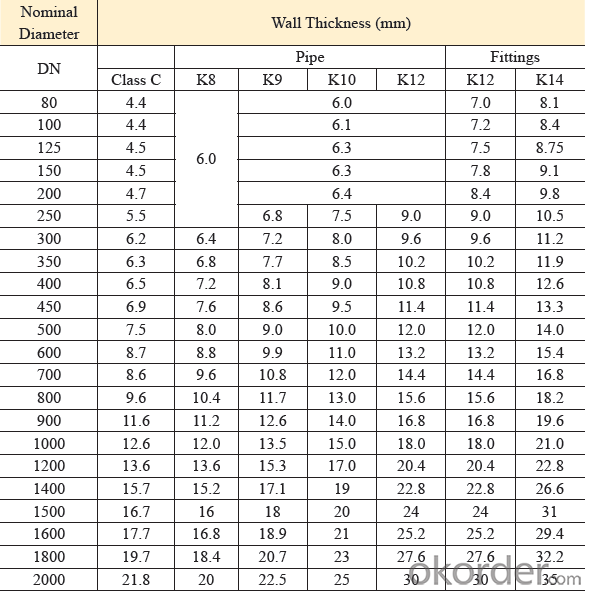
Quality:
ISO 2531 or EN 545 Standard K9 Class, K12 Class
1. ISO 9001 Certificate
2. ISO 2531 & EN 545 Certificate
3. WRAS Potable Water Certificate for FBE Internal Lining
4. WRAS EPDM Rubber Gasket or NBR Rubber Gasket
5. DN80mm - DN2000mm
6. Black Bitumen or Blue FBE / Epoxy Coating
7. Lengh = 6m or cut into 5.6m, 5.7m, 5.8m
8. Client's Brand Customization Allowable
9. Container or Bulk Loading / Shipping
10.Delivery within one Month or According to Client's Order Quantity
11. Support Client or The Third Party Inspection before Shipment
Standard Lining and Coating:
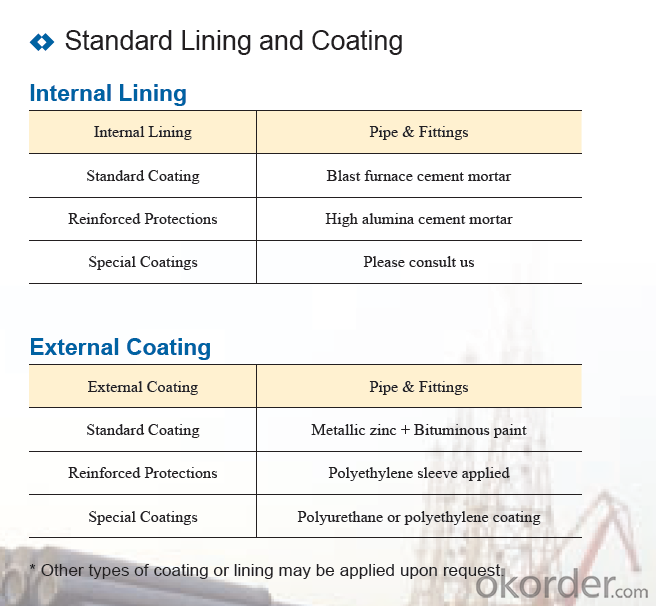
Transport:
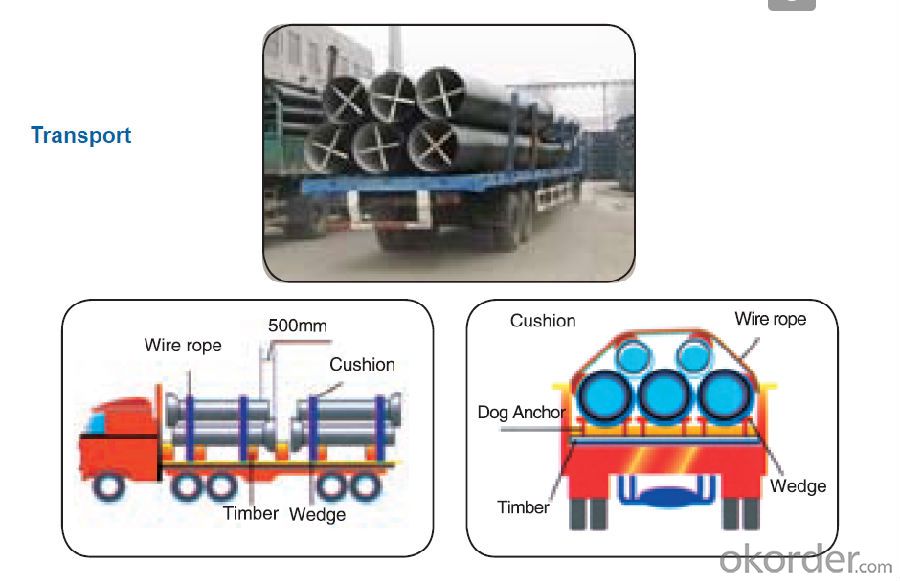
- Q: Principles for the antiseptic treatment of ductile iron pipes
- Anti corrosion process of ductile iron pipe:1. asphalt paint coatingBituminous paint coatings are pipes used to carry gas. Preheating the pipe before spraying can improve the adhesion of asphalt paint and accelerate drying.2. cement mortar lining + special coatingThe internal corrosion prevention measures are suitable for pipes conveying sewage, and the corrosion resistance of lining can be improved.3. epoxy coal tar coatingThe epoxy coal tar coating is not only suitable for gas pipelines, but also for sewage pipes. It is a two component coating with a high adhesion and a very smooth surface
- Q: What are the typical lengths of ductile iron pipes?
- The typical lengths of ductile iron pipes can vary depending on the specific project requirements and industry standards. However, commonly used lengths for ductile iron pipes range from 18 feet (5.5 meters) to 20 feet (6 meters). These lengths are suitable for various applications such as water distribution, wastewater systems, and industrial pipelines. It is important to note that custom lengths can also be manufactured to meet specific project needs.
- Q: Can ductile iron pipes be used in contaminated groundwater systems?
- Yes, ductile iron pipes can be used in contaminated groundwater systems. Ductile iron pipes are known for their corrosion resistance, making them suitable for handling water with various levels of contamination. Additionally, their strength and durability allow them to withstand the harsh conditions of contaminated groundwater systems.
- Q: Can ductile iron pipes be recycled?
- Indeed, it is possible to recycle ductile iron pipes. Ductile iron, a form of cast iron, possesses exceptional strength and endurance, rendering it a favored selection for numerous purposes, such as water and sewage pipelines. Once these pipes have surpassed their useful lifespan, they can undergo recycling and be transformed into fresh merchandise. The recycling procedure comprises the fusion of the ductile iron pipes to extract the iron, subsequently serving as a raw material for the creation of novel ductile iron goods. By recycling ductile iron pipes, not only do we conserve natural resources, but we also diminish the environmental impact associated with mining and the production of new substances.
- Q: What is the typical lifespan of ductile iron pipe?
- The lifespan of ductile iron pipe can differ based on several factors, including the pipe's quality, the conditions it faces, and the maintenance practices employed. On average, ductile iron pipe typically lasts about 100 years. This longevity is a result of its inherent strength and durability, allowing it to withstand high pressure and various environmental conditions. Furthermore, ductile iron pipe is often coated with protective materials like cement mortar lining or polyethylene encasement, which further enhance its durability. Regular inspections and maintenance can also contribute to extending the lifespan of ductile iron pipe by promptly identifying and addressing any issues or potential damages.
- Q: Are ductile iron pipes suitable for irrigation canal systems?
- Yes, ductile iron pipes are suitable for irrigation canal systems. Ductile iron pipes have high strength and durability, making them resistant to external loads and pressure variations common in irrigation systems. They also have excellent corrosion resistance, ensuring a long lifespan and minimizing maintenance needs. Additionally, ductile iron pipes have smooth interiors, reducing friction and allowing for efficient water flow, which is crucial for irrigation canal systems.
- Q: Can ductile iron pipes be used in contaminated soil conditions?
- Indeed, contaminated soil conditions pose no obstacle to the utilization of ductile iron pipes. Ductile iron boasts exceptional attributes such as robustness, endurance, and resistance to corrosion, rendering it appropriate for diverse soil conditions, even those tainted by chemicals or other harmful substances. The material's resistance to corrosion guarantees the pipes' ability to endure the adverse conditions and sustain their structural integrity throughout time. Nevertheless, it is crucial to take into account the nature and extent of soil contamination and seek guidance from specialists to ascertain whether supplementary protective measures or coatings are necessary to ensure the pipes' enduring efficiency.
- Q: Can ductile iron pipes be used for underground water treatment systems?
- Yes, ductile iron pipes can be used for underground water treatment systems. Ductile iron is known for its strength and durability, making it a suitable choice for underground applications. Additionally, ductile iron pipes have excellent corrosion resistance, which is important for water treatment systems that may come into contact with various chemicals and contaminants.
- Q: Can ductile iron pipes be used in coastal or marine environments?
- Yes, ductile iron pipes can be used in coastal or marine environments. Ductile iron is a type of cast iron that has been treated with magnesium to give it enhanced strength, ductility, and resistance to corrosion. This makes it suitable for use in environments with high levels of moisture, such as coastal or marine areas. Coastal and marine environments are known for their high levels of saltwater, which can cause corrosion in metal pipes. However, ductile iron pipes have excellent corrosion resistance due to their protective coating. This coating acts as a barrier between the pipe and the corrosive elements present in saltwater, preventing the formation of rust and extending the lifespan of the pipes. Furthermore, ductile iron pipes can withstand the high pressures and stresses associated with coastal and marine applications. They have a high tensile strength, allowing them to handle the weight of soil, rocks, and other materials that may be present in these environments. Additionally, ductile iron pipes are resistant to damage from external forces, such as waves or debris, making them a reliable choice for coastal or marine projects. In summary, ductile iron pipes are a suitable choice for coastal or marine environments due to their corrosion resistance, high tensile strength, and durability. They can reliably transport water or other fluids in these challenging environments while maintaining their structural integrity over an extended period of time.
- Q: Can ductile iron pipes be used for gas distribution networks?
- Yes, ductile iron pipes can be used for gas distribution networks.
Send your message to us
Duct Iron Pipe DI Pipe ISO 2531 DN 80-2000mm K8
- Loading Port:
- Tianjin
- Payment Terms:
- TT OR LC
- Min Order Qty:
- 100 m
- Supply Capability:
- 100000 m/month
OKorder Service Pledge
OKorder Financial Service
Similar products
Hot products
Hot Searches
Related keywords


